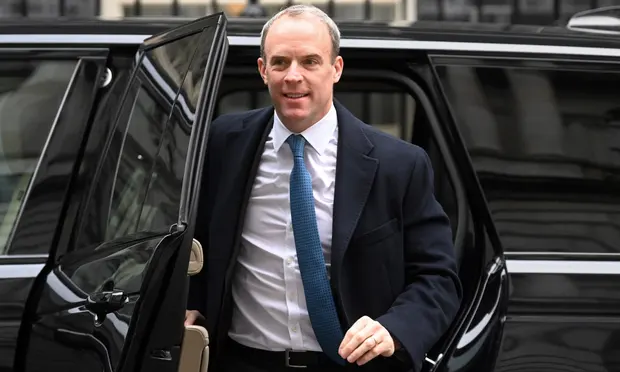Dominic Raab has said he “behaved professionally at all times” as a minister, despite facing criticism of his behaviour from dozens of officials.
In a rare interview, the deputy prime minister told the Telegraph he wanted to set high standards in office, and added that he believed in “zero bullying”.
Raab has remained relatively quiet since the prime minister, Rishi Sunak, ordered an investigation into eight complaints made about him by civil servants in three departments. Staff report being given extremely difficult demands on unreasonable deadlines, with a group complaint alleging that some officials had to be signed off work for extended periods of time because of the stress they were under.
The lawyer Adam Tolley has been appointed to investigate the claims, but government insiders say his report could still be weeks from publication. If Raab has to leave office, it will be the third cabinet minister to resign or be sacked since Sunak entered No 10 in October.
Raab told the Telegraph: “I’m confident I have behaved professionally at all times. And I will engage with the inquiry, and of course I would not want to say anything that prejudiced it.”
Asked to compare his behaviour with previous Conservative governments such as that of Margaret Thatcher, he added: “I think it’s difficult to compare different eras. But I think standards of professionalism, whether they’re in the business sector, the voluntary sector or the public sector, should involve setting high standards and zero bullying, and those two things are perfectly reconcilable.”
Separately, he told the BBC: “I’m confident I behaved professionally at all times. Of course I called for the inquiry and I’ll respect the outcome.”
Raab’s comments were criticised by Dave Penman, general secretary of the civil service union, the FDA, who told the BBC’s Today programme on Friday: “What we need is for the inquiry to conclude as quickly as possible, and for the protagonists – who have been reminded of the need for confidentiality – to stop giving comments to the public.”
Penman added: “If you bully civil servants as part of your role as a minister then that is a breach of the [ministerial] code, and the prime minister has to make a judgment whether you should still be in office.”
Raab faces multiple allegations of bullying from civil servants, including a formal group complaint, which represents the concerns of 27 officials. The complaint says: “The combination of the pressure of work and unreasonable deadlines has had such an impact on some colleagues’ mental and physical health that they have visited their GPs, and some have subsequently been signed off work for extended periods of time.”
As far back as 2018, a senior official at the Brexit department sent a “serious expression of concern” about Raab’s behaviour to the Cabinet Office. In August 2021, officials said the then foreign secretary’s refusal to speak to some staff he considered “time wasters” led to delays and blockages that hampered the evacuation of Afghanistan.
Downing Street has insisted Sunak was not aware of any formal complaints against Raab when he reappointed him to government in late October. The prime minister’s spokesperson has refused to say, however, whether he was aware of any informal complaints.
When a formal complaint was submitted in November, Sunak appointed Tolley to investigate the allegations. Since then, the barrister has interviewed at least three top civil servants who have worked with Raab in government: Simon McDonald, the former permanent secretary at the Foreign Office, Antonia Romeo, the permanent secretary at the Ministry of Justice, and Philip Rycroft, who ran the Brexit department while Raab was in charge there.
Source: The Guardian


